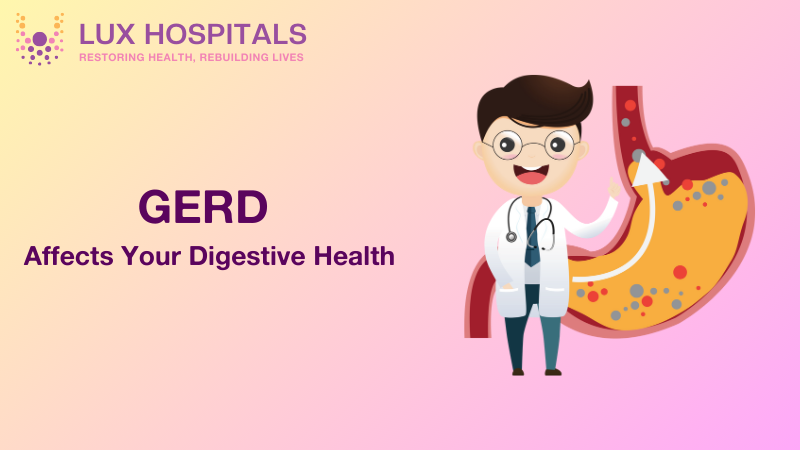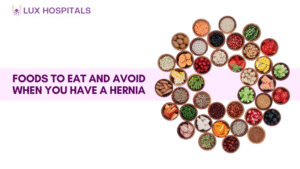GERD and Its Impact on Your Digestive Health: A Comprehensive Guide

Gastroesophageal reflux disease (GERD) is a chronic digestive disease that hits so many people around the earth. If you suffer from symptoms of heartburn, regurgitation, and discomfort after eating very frequently, then you are probably suffering from GERD.
This may further affect your overall health and digestive system once it becomes advanced. So, here is everything you should know regarding the causes, symptoms, treatment, and probable complications of GERD.
What is GERD?
Gastroesophageal reflux disease, or GERD, is a chronic condition where stomach acid regularly backs up into the esophagus. This acid reflux causes irritation of the oesophageal lining, which can cause discomfort and complications over time. Everyone occasionally experiences acid reflux. Still, when it happens often and interferes with daily life, it might be considered GERD.
Causes of GERD
Lower esophageal sphincter weakness, which affects the muscle that serves as a valve between the stomach and the esophagus, is the cause of GERD. If the LES does not close tightly, stomach acid may flow back into the esophagus, irritating it.
There are many contributory factors to GERD, such as :
- Obesity: Acid is forced into the esophagus by the extra pressure that being overweight places on the stomach.
- Dietary triggers: Foods that trigger acid reflux are spicy foods, citrus fruits, chocolate, caffeine, and fatty foods.
- Hiatal hernia: A situation in which the LES is weakened as the stomach partially pushes through the diaphragm into the chest cavity.
- Smoking and alcohol: Both can weaken the LES, allowing reflux to occur.
- Pregnancy: Increased stomach pressure and the hormonal changes that take place during pregnancy may cause GERD symptoms.
- Medications: Certain medications like aspirin, ibuprofen, and muscle relaxants may cause acid reflux.
Symptoms of GERD
Gerd has many symptoms, from mild to severe. The common symptoms include:
- Heartburn: A burning feeling in the chest, mainly after eating or lying down.
- Regurgitation: Acid that backs up into the mouth or throat and tastes sour or bitter.
- Dysphagia: Trouble swallowing; the sensation that food is stuck in the throat.
- Chronic cough: A persistent cough, usually at night.
- Sore throat and hoarseness: From the irritation by stomach acid.
- Chest pain: Typically misinterpreted as heart-related problems.
If these symptoms become frequent, it is necessary to visit the doctor to avoid further complications.
How GERD Affects Digestive Health
GERD can negatively impact digestive health in several ways:
- Esophageal inflammation (esophagitis): Repeated exposure to stomach acid can inflame and damage the esophagus.
- Esophageal strictures: Scarring from acid exposure can narrow the esophagus, making swallowing difficult.
- Barrett’s esophagus: Long-term GERD increases the risk of developing this precancerous condition.
- Tooth enamel erosion: Acid reflux can wear away tooth enamel, leading to dental problems.
GERD Treatment Options
Treatment for GERD aims to decrease acid reflux, alleviate symptoms and prevent complications. The treatments include lifestyle modification, medications and, in severe cases, surgery.
Lifestyle Changes
- Dietary modification: Avoid foods that trigger symptoms, including spicy food, caffeine, and fatty foods.
- Weight control : Maintaining a healthy weight may decrease pressure on the stomach.
- Eating habits : Avoid lying down after eating, and eat small meals throughout the day.
- Head of bed elevation: This may be done to prevent nocturnal reflux.
- Quit smoking and decrease alcohol intake : Both activities enhance LES function and relieve symptoms.
Medications
OTC and prescription medications are available to alleviate GERD symptoms:
- Antacids: Inactivate stomach acid and bring relief quickly.
- H2 receptor antagonist: Reduce acid production e.g. ranitidine, famotidine
- Proton pump inhibitors (PPIs): Stronger acid reducers (e.g., omeprazole, esomeprazole) that help heal the esophagus.
GERD Surgery
For more severe cases where lifestyle changes and medication are ineffective, surgery is an option for GERD. The following are the common surgical procedures:
- Fundoplication: To strengthen the LES and stop reflux, the upper portion of the stomach is wrapped around it.
- LINX device: A small magnetic ring is placed around the LES to help keep it closed when not swallowing.
Prevention of GERD and Digestive Health
Prevention is an integral part of managing GERD and maintaining digestive health. The key preventive measures would include:
- A healthy, balanced diet that is full of fibers and lean proteins.
- Drink plenty of water and be cautious with carbonated beverages.
- Exercising regularly while avoiding activities that put pressure on the abdomen.
Conclusion
GERD is common, yet it’s a severe digestive disorder affecting one’s quality of life. The best course of action for this issue might be to comprehend the source, symptoms, and treatment. The majority of the time, GERD symptoms can be reduced and your general digestive health can be maintained by changing your lifestyle, taking medicine as necessary, and, in more severe cases, thinking about having surgery. If you are symptomatic over time, consult a healthcare professional who will suggest a treatment course suitable for your situation.
Frequently Asked Questions
A weaker lower esophageal sphincter (LES) permits stomach acid to reflux into the esophagus, which is the cause of GERD. Contributing factors include obesity, spicy or fatty foods, smoking, alcohol, pregnancy, and certain medications.
Acid reflux is the occasional backflow of stomach acid into the esophagus, while GERD is a chronic condition where acid reflux occurs frequently and causes complications.
While GERD can be managed effectively with lifestyle changes and medications, and in some cases surgery, it is a chronic condition that may require long-term management.
If you experience severe symptoms that interfere with your daily life or if you develop difficulty swallowing, chest pain or unexplained weight loss, consult a doctor at Lux Hospitals for expert care and treatment.
Avoid spicy foods, citrus fruits, caffeine, alcohol, chocolate, fatty foods, and carbonated drinks, as they can trigger acid reflux.



















